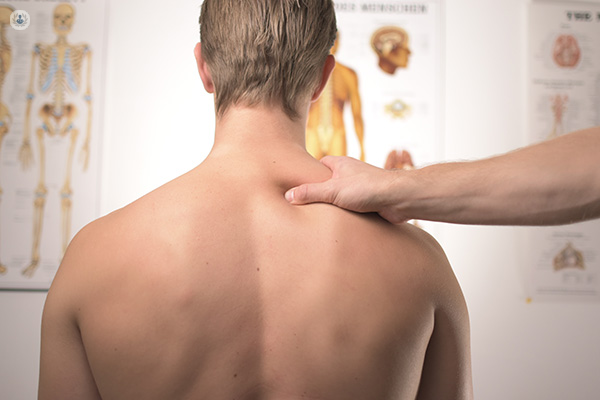What is back pain?
Pain in the back is fairly common and usually goes away after a matter of weeks or months. Individuals can experience pain in any part of the back, from the coccyx at the bottom of the spine to the neck. The most common complaint is low back pain (also known as lumbago).
Depending on the cause of the back pain, a number of specialists may be involved in treating back pain, including neurosurgeons, orthopaedic surgeons, and rheumatologists.

What are the causes of back pain?
Back pain can occur as the result of:
- Injury, e.g. a sprain or pulled muscle
- A slipped disc
- Sciatica
- Ankylosing spondylitis
In the case of the latter three, there are usually further symptoms, such as tingling, numbness, or weakness.
Other causes of back pain are rarely serious and in many cases the cause is not clear (non-specific back pain). Non-specific back pain usually clears up on its own with time.
Can back pain be prevented?
It is impossible to prevent back pain with 100% certainty, but it is possible to reduce the risk of developing pain from musculoskeletal injuries:
- Perform back stretches and exercises regularly
- General exercise – it is recommended that adults do 150 minutes of exercise each week.
- Don’t sit in one position for long periods at work or while driving.
- Maintain a good posture while sitting
- Take care while lifting
- Make sure you sleep on a supportive mattress
- Lose weight if you are overweight.
Back pain relief
In most cases, taking the following measures can provide some relief from back pain:
- Keep active – it is important to try to go about your daily activities as normal. Too much resting in one position can actually make your back pain worse.
- Perform back stretches and exercises.
- Engage in activities such as swimming, walking, yoga, and pilates.
- Apply heat or cold – compresses, hot water bottles, or a bag of frozen peas can all provide short-term relief.
- Take anti-inflammatory painkillers, e.g. ibuprofen.
- Stay positive – there may be some truth in mind-over-matter, since people who stay optimistic seem to recover quicker on average. Remember that the odds are the pain will disappear with time.
Back pain treatment
When to seek medical advice for back pain:
Duration: Seek medical advice if your back pain persists for more than a few weeks, as it may indicate an underlying issue.
Intensity: Intense back pain that hinders daily activities should be addressed promptly.
Worsening: If your pain worsens over time, consult a healthcare professional to rule out serious conditions.
Seeking medical help:
Start with your general practitioner (GP). They may recommend:
Conservative management: Rest, over-the-counter pain relief, and lifestyle changes.
Specialist referral: If needed, your GP may refer you to a specialist.
Physiotherapy: A physiotherapist can provide tailored exercises to strengthen your back and improve posture.
Treatment options:
Group exercise classes: These classes can enhance core strength and flexibility to alleviate back pain.
Manual therapy: Techniques like massage or chiropractic adjustments can relieve muscle tension and joint issues.
Psychological therapy (CBT): Consider CBT for chronic back pain, especially if psychological factors contribute to your discomfort.
Always follow your healthcare professional's advice to effectively manage your back pain.
11-13-2012 07-04-2024
Back pain
Mr Jonathan Bull - Neurosurgery
Created on: 11-13-2012
Updated on: 07-04-2024
Edited by: Kate Forristal
What is back pain?
Pain in the back is fairly common and usually goes away after a matter of weeks or months. Individuals can experience pain in any part of the back, from the coccyx at the bottom of the spine to the neck. The most common complaint is low back pain (also known as lumbago).
Depending on the cause of the back pain, a number of specialists may be involved in treating back pain, including neurosurgeons, orthopaedic surgeons, and rheumatologists.

What are the causes of back pain?
Back pain can occur as the result of:
- Injury, e.g. a sprain or pulled muscle
- A slipped disc
- Sciatica
- Ankylosing spondylitis
In the case of the latter three, there are usually further symptoms, such as tingling, numbness, or weakness.
Other causes of back pain are rarely serious and in many cases the cause is not clear (non-specific back pain). Non-specific back pain usually clears up on its own with time.
Can back pain be prevented?
It is impossible to prevent back pain with 100% certainty, but it is possible to reduce the risk of developing pain from musculoskeletal injuries:
- Perform back stretches and exercises regularly
- General exercise – it is recommended that adults do 150 minutes of exercise each week.
- Don’t sit in one position for long periods at work or while driving.
- Maintain a good posture while sitting
- Take care while lifting
- Make sure you sleep on a supportive mattress
- Lose weight if you are overweight.
Back pain relief
In most cases, taking the following measures can provide some relief from back pain:
- Keep active – it is important to try to go about your daily activities as normal. Too much resting in one position can actually make your back pain worse.
- Perform back stretches and exercises.
- Engage in activities such as swimming, walking, yoga, and pilates.
- Apply heat or cold – compresses, hot water bottles, or a bag of frozen peas can all provide short-term relief.
- Take anti-inflammatory painkillers, e.g. ibuprofen.
- Stay positive – there may be some truth in mind-over-matter, since people who stay optimistic seem to recover quicker on average. Remember that the odds are the pain will disappear with time.
Back pain treatment
When to seek medical advice for back pain:
Duration: Seek medical advice if your back pain persists for more than a few weeks, as it may indicate an underlying issue.
Intensity: Intense back pain that hinders daily activities should be addressed promptly.
Worsening: If your pain worsens over time, consult a healthcare professional to rule out serious conditions.
Seeking medical help:
Start with your general practitioner (GP). They may recommend:
Conservative management: Rest, over-the-counter pain relief, and lifestyle changes.
Specialist referral: If needed, your GP may refer you to a specialist.
Physiotherapy: A physiotherapist can provide tailored exercises to strengthen your back and improve posture.
Treatment options:
Group exercise classes: These classes can enhance core strength and flexibility to alleviate back pain.
Manual therapy: Techniques like massage or chiropractic adjustments can relieve muscle tension and joint issues.
Psychological therapy (CBT): Consider CBT for chronic back pain, especially if psychological factors contribute to your discomfort.
Always follow your healthcare professional's advice to effectively manage your back pain.


How is inflammatory back pain diagnosed?
By Dr Gagandeep Kaur Takhar
2024-11-21
On hand here to explain just how inflammatory back pain is typically diagnosed and managed is esteemed consultant rheumatologist, Dr Gagandeep Kaur Takhar. See more


Living with lumbar spondylosis: What are the do’s and don’ts?
By Mr Stewart Tucker
2024-11-21
Leading consultant orthopaedic spinal surgeon Mr Stewart Tucker gives an expert guide to degenerative lumbar spondylosis, including the various approaches to treatment and when surgery is necessary. See more


Do I have sacroiliac joint pain or a herniated disc?
By Mr Amarjit Anand
2024-11-21
Learn from a leading spinal surgeon about the overlapping symptoms of sacroiliac joint pain and a herniated disc, as well as how a diagnosis is made and what treatment is available. See more


What is a multidisciplinary team (MDT) and why do we need them?
By Mr Nicholas Thomas
2024-11-21
Nowadays, a variety of conditions are treated by teams of doctors composed of several different specialists with expertise in different medical fields. Why are these multidisciplinary teams (MDTs) necessary? Mr Nicholas Thomas, a leading London neurosurgeon and member of London Neurosurgery Partnership, explains. See more
Experts in Back pain
-
Mr David Bell
NeurosurgeryExpert in:
- Arm pain
- Back pain
- Neck pain
- Sciatica
- Spinal surgery
- Vertebroplasty
-
Mr Christos Tolias
NeurosurgeryExpert in:
- Brain aneurysm
- Degenerative disc disease
- Spinal surgery
- Vascular malformations
- Arteriovenous malformation
- Back pain
-
Professor Roger Wolman
RheumatologyExpert in:
- Osteoporosis
- Osteoarthritis
- Back pain
- Hypermobility
- Inflammatory arthritis
- Sports medicine
-
Dr James Blackburn
Pain medicineExpert in:
- Back pain
- Neck pain
- Neuropathic pain
- Sciatica
- Trigeminal neuralgia
- Cancer Pain
-
Dr Dhiya Houssien
RheumatologyExpert in:
- Back pain
- Elbow Pain
- Fibromyalgia
- Neck pain
- Rheumatoid arthritis
- Osteoarthritis
- See all

The Saxon Clinic - part of Circle Health Group
The Saxon Clinic - part of Circle Health Group
V7 Saxon St, Coffee Hall, Milton Keynes MK6 5LR
No existe teléfono en el centro.
By using the telephone number provided by TOP DOCTORS, you automatically agree to let us use your phone number for statistical and commercial purposes. For further information, read our Privacy Policy
Top Doctors

Albyn Hospital - part of Circle Health Group
Albyn Hospital - part of Circle Health Group
21 Albyn Pl, Aberdeen
No existe teléfono en el centro.
By using the telephone number provided by TOP DOCTORS, you automatically agree to let us use your phone number for statistical and commercial purposes. For further information, read our Privacy Policy
Top Doctors

The UK Spine Centre
The UK Spine Centre
19 Harley St, W1G 9QJ
No existe teléfono en el centro.
By using the telephone number provided by TOP DOCTORS, you automatically agree to let us use your phone number for statistical and commercial purposes. For further information, read our Privacy Policy
Top Doctors
-
The Saxon Clinic - part of Circle Health Group
V7 Saxon St, Coffee Hall, Milton Keynes MK6 5LR, Milton KeynesExpert in:
- General Surgery
- Orthopaedic surgery
- Gastroenterology
- Obstetrics and Gynaecology
- Paediatrics
- Urology
-
Albyn Hospital - part of Circle Health Group
21 Albyn Pl, Aberdeen, AberdeenExpert in:
- Orthopaedic surgery
- Gastroenterology
- Obstetrics and Gynaecology
- Ophthalmology
- Breast Pathology
-
The UK Spine Centre
19 Harley St, W1G 9QJ, Central LondonExpert in:
- Kyphoplasty
- Laser disc surgery
- Lumbar discectomy
- Spine
- Spinal stenosis
- Lumbar fusion
- Most viewed diseases, medical tests, and treatments
- Migraine
- Joint pain
- Testicular ultrasound
- Lumbar herniated disc
- Breast ultrasound
- Abdominal pain
- Shoulder pain
- Parkinson's disease
- Expert witness
- Lifestyle medicine








